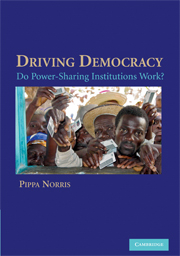Book contents
Select Bibliography
Published online by Cambridge University Press: 05 September 2012
- Type
- Chapter
- Information
- Driving DemocracyDo Power-Sharing Institutions Work?, pp. 271 - 294Publisher: Cambridge University PressPrint publication year: 2008

